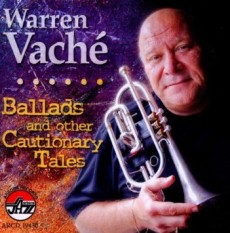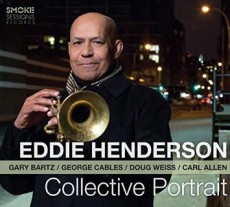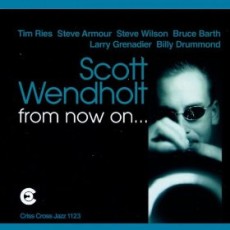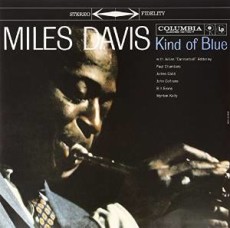
Daily Dose Of Jazz…
Warren Vaché, born February 21, 1951 in Rahway, New Jersey came from a musical family. His father was a bassist, author of several jazz books and a critic, while his mother was a secretary at Decca Records. He began playing piano in the third grade but soon switched to trumpet so he could play in the fourth grade band and his father immediately bought him a cornet.
Over the years Warren has looked to Louis Armstrong, Roy Eldridge, Bobby Hacket, Fats Navarro, Tom Harrell and Ruby Braff as his sources of inspiration. Throughout high school and while attending Montclair State College he played gigs from dance to weddings and all kinds of receptions.
Part of his formal training by studying under Pee Wee Erwin and continued with him playing in polka, Dixieland, big dance and Broadway pit bands, as well as small jazz groups and large free-wheeling combos.
His first professional job was with the Billy Maxted band in Detroit in 1972. From there he ventured on to play th Broadway production of Mr. Jazz, work with George Wein and finally landing in Benny Goodman’s band. There he played with Hank Jones, Urbie Green, Zoot Sims and Slam Stewart.
He became part of the Condon’s house band, had his debut release, First Time Out on the Monmouth label, but Concord Records gave him his biggest exposure working with Scott Hamilton, John Bunch, Jake Hanna and Cal Collins. He has also worked with Bucky Pizzarelli and Howard Alden.
Swing master cornet, flugelhorn and trumpeter Warren Vaché currently maintains a full schedule of recording, worldwide festivals appearances, Broadway and club dates.
More Posts: cornet,flugelhorn,trumpet

Daily Dose Of Jazz…
Eddie Henderson was born on October 26, 1940 in New York City. His mother was an original Cotton Club dancer and his father sang with a popular singing group of the day, Billy Williams and The Charioteers. At the age of nine he got an informal lesson by Louis Armstrong and continued his study of the instrument as a teenager at the San Francisco Conservatory of Music, after his family moved there in 1954. As a young man, he performed with the San Francisco Conservatory Symphony Orchestra. In 1957 he met Miles Davis, a friend of his parents and played a gig together when he was just 17.
After three years in the Air Force, Henderson enrolled at the University of California, Berkeley graduating with a B.S. in zoology in 1964. He then studied medicine at Howard University, then went back to the Bay area undertook his residency in psychiatry in 1968, he practiced general medicine from 1975 to 1985 in San Francisco part-time for about four hours a day working at a small clinic.
His break in music came when he took a weeklong gig with Herbie Hancock’s Mwandishi band that led to a three-year job. It was during this period in the early 70s that her recorded three albums with the group but more importantly came out as a leader and recorded his debut album Realization followed by Inside Out.
After leaving Hancock, Eddie worked extensively with Pharoah Sanders, Mike Nock, Norman Connors, and Art Blakey’s Jazz Messengers. He joined Latin jazz band Azteca, recorded with Charles Earland and fronted his own bands, both jazz and rock-oriented. However, recognized for his work with Hancock, his own records were considered too commercial.
By the 1990s, Henderson returned to playing acoustic hard bop, touring with Billy Harper while also working as a physician. He recorded at Miles tribute album So What? with Bob Berg, Dave Kikoski, Ed Howard and Victor Lewis. He has collaborated with his wife Natsuko who composed Tender You, Precious Moment, Around the World in 3/4 and Be Cool.
As an educator trumpet and flugelhorn player Eddie Henderson has been a faculty member of Juilliard since 2007 and is Associate Professor of Trumpet at the Oberlin Conservatory Jazz Department, beginning in 2014. He has recorded 23 albums as a leader, has released two anthologies, and recorded nearly four-dozen sessions as a sideman with Benny Golson, Mulgrew Miller, Richard Davis, Gary Bartz, Leon Thomas, Billy Hart, McCoy Tyner, Mal Waldron, Stanley Cowell, Grover Washington, Jr., Kenny Barron, Joe Farnsworth and the Mingus Big Band to name a few.
More Posts: flugelhorn,trumpet

Daily Dose Of Jazz…
Stacy Rowles was born on September 11, 1955 to jazz pianist and composer Jimmy Rowles. Picking up an old trumpet in the family home she took right to it. She first performed with her father at the Monterey Jazz Festival and for a period she studied with vibraphonist Charlie Shoemake.
Perpetually undiscovered in America except on the West Coast but was better known in Europe. Stacy made her name partly in the company of her father, with whom she often played until shortly before his death in 1996.
She played restful, melodic solos with a warm tone and sang in a wise, honest voice, shy but swinging. She recorded her debut and only album Tell It Like It Is in 1984. Rowles recorded albums with her father titled I’m Glad There Is You, Me and the Moon and Looking Back. She also recorded with the Ben Sluijs Quartet and Frank Mantooth.
For a stretch in the early ’90s, father and daughter shared a weekly gig at Linda’s, a Los Angeles jazz club. On her own, Stacy also played regularly in several all-female jazz groups, including the all-female quintet the Jazz Birds, Maiden Voyage, in both of which she played alongside the trumpeter Betty O’Hara, the Jazz Tap Ensemble, the DIVA Big Band and the European band Witchcraft, with which she had toured since 2002.
Trumpeter, flugelhorn player and singer Stacy Rowles who had been active on the Los Angeles jazz scene since the 1980s, passed away from complications due to a car accident on October 30, 2009 at her home in Burbank, Calif. She was 54.
More Posts: flugelhorn,trumpet,vocal

Daily Dose Of Jazz…
Scott Wendholt was born on July 21, 1965 in Denver, Colorado. He first picked up the trumpet in the third grade and began improvising in the fifth. Linda Walker and Ed Barnes, were two teachers he was inspired by, the latter ran a citywide elementary school group that played some Blues and a reasonable facsimile of jazz and provided at least some tools for jazz improvisation.
His major influences at the time were Al Hirt, Chuck Mangione, and Spyro Gyra until the ninth grade, when Greg Gisbert, a classmate and trumpeter, hipped him to Art Blakey’s “Straight Ahead,” featuring Wynton Marsalis and he started taking trumpet lessons in high school. Scott went on to study At Indiana University in David Baker’s Jazz Studies Program earning his bachelor degree.
A move to Cincinnati was fortuitous for the young trumpeter getting on the scene, landing him at the King’s Island amusement park with a Rock-and-Roll band. From there he went to work with the Blue Wisp Big Band, and working sideman gigs. It was a good training ground to be a leader, for learning appropriate tunes for small group gigs and learning how to hang out.
In 1991 Scott put together a quartet to play at Augie’s, a Harlem bar near Columbia University and the group lasted three and a half years. Then 1992, saw Vincent Herring hiring him for his first real legitimate sideman gig. Then a year later in 1993 Scott recorded his debut album The Scheme of Things on the Criss Cross Jazz label. He would go on to work inside the big band culture in New York City with the likes of Toshiko Akiyoshi, Bob Mintzer, the Maria Schneider Orchestra, the Carnegie Hall Big Band and the Vanguard Jazz Orchestra.
Wendholt has worked with Gisbert, Javon Jackson, John Gunther, Ralph Bowen, Chris Botti, Don Braden, Rim Ries, Roberta Piket, Bobby McFerrin, Dwayne Burno, Mike Abbott, Al DiMeola, Lounge Lizards, Sophie B. Hawkins, Peter Abbott, Brad Leali, John Fedchock, Woody Herman, Ira Coleman, Billy Drummond, Eric Alexander, Anthony Wonsey, Bob Mintzer, Bill Cunliffe, Phil DeGreg, Vincent Herring, Jim McNeely, Mingus Big Band, Buddy Rich and the list goes on and on.
Not one to reside in a single musical genre, the Mile High City trumpeter and flugelhorn player Scott Wendholt continues to perform, record and compose.
More Posts: flugelhorn,trumpet

Daily Dose Of Jazz…
Miles Dewey Davis III was born May 26, 1926 in Alton, Illinois into an affluent family, father a dentist and his mother a blues pianist. They owned a substantial ranch in the Delta region of Pine Bluffs, Arkansas. When he was one years old the family moved to East St. Louis and it was between there and Pine Bluffs that his appreciation for music came out of the Black church.
His musical studies began at 13, when his father gave him a trumpet and arranged lessons with local musician Elwood Buchanan. He learned to play with out vibrato which gave him his clear signature tone. By age 16, Davis was a member of the music society and, when not at school, playing professionally first at the local Elks Club. At 17, he spent a year playing in Eddie Randle’s band, the Blue Devils and during this time, Sonny Stitt tried to persuade him to join the Tiny Bradshaw band, then passing through town. His mother insisted that he finish his final year of high school and he graduated from East St. Louis Lincoln High School in 1944.
In 1944, the Billy Eckstine band visited East St. Louis with Dizzy Gillespie and Charlie Parker in tow. Miles was brought in on third trumpet for a couple of weeks because the regular player, Buddy Anderson, was out sick. Even after this experience, once Eckstine’s band left town, Davis’ parents were still keen for him to continue formal academic studies.
However, In the fall of 1944, following graduation from high school, Davis moved to New York City to study at the Juilliard School of Music. His arrival marked a new chapter and he spent his first weeks attempting to contact Charlie Parker, against all advice even from Coleman Hawkins. Finally locating his idol, he became one of the cadre of musicians who held nightly jam sessions at Minton’s Playhouse and Monroe’s, both Harlem nightclubs. He was among future leaders of bebop Fats Navarro, Freddie Webster, J. J. Johnson as well as the established Thelonious Monk and Kenny Clarke.
Dropping out of Juilliard after asking permission from his father, Miles began playing professionally, performing in several 52nd Street bands led by Coleman Hawkins, and Eddie Lockjaw Davis. By 1945, he entered a recording studio for the first time, under the leadership of Herbie Field. This was the beginning of his many sideman recordings until 1946 when he recorded as a leader with the Miles Davis Sextet plus Earl Coleman and Ann Hathaway. Though a member of the groundbreaking Charlie Parker Quintet, he can be heard accompanying singers. He would play with Max Roach, Al Haig, Sir Charles Thompson, Duke Jordan, Curley Russell, Tommy Potter and Leonard Gaskin. This gave him numerous recording sessions and the beginning of what would become his cool jazz style.
After Parker’s breakdown and committal to Camarillo State Mental Hospital while on tour in Los Angeles, Davis, found himself stranded. He roomed and collaborated for some time with Charles Mingus, got a job with Billy Eckstine and eventually got back to New York. He would freelance and sideman in some of the most important combos on the New York jazz scene.
By 1948 Davis grew close to Canadian composer and arranger Gil Evans and his basement apartment had become the meeting place for several young musicians and composers such as Davis, Roach, John Lewis and Gerry Mulligan who were unhappy with the bebop scene. Together they created the tuba band sound that included French horn and tuba in the nonet line-up. The objective was to achieve a sound similar to the human voice, through carefully arranged compositions and by emphasizing a relaxed, melodic approach to the improvisations.
A contract and recording sessions between 1949-1950 with Capitol Records brought about the release of Birth Of The Cool in 1956, which gave its name to the cool jazz movement. Though met with resistance, years later it was co-opted by white musicians like Mulligan and Dave Brubeck and the critics who hailed it as a success.]
By the first half of the 1950s Davis was on tour in Paris with Tadd Dameron, Kenny Clarke and James Moody, and living the life of a black musician abroad. He was involved with French actress and singer Juliette Greco for a time and then returned to the States to be underappreciated by the critics and a liaison with the mother of his two children unraveled. This is when his heroin addiction began, with subsequent arrests. But iwas during this period that he became acquainted with Ahmad Jamal’s music and his elegant approach and use of space influenced him deeply and he definitely severed all ties to bebop.
Through the decade he would record for Prestige, work with Art Blakey, Sonny Rollins and John Coltrane, began using the Harmon mute creating a signature sound and phrasing. The most important Prestige recordings of this period were Dig, Blue Haze, Bag’s Groove, Miles Davis and the Modern Jazz Giants and Walkin’. This placed him in the center of the hard bop movement. It also hailed his period of withdrawal, being distant, cold, contempt for critics, and his quick temper.
His first great quintet included John Coltrane, Red Garland, Paul Chambers and Philly Joe Jones. This group brought forth such titles as Relaxin’, Steamin’, Workin’ and Cookin’ all with The Miles Davis Quintet. From 1957 to 1963 Davis recorded a series of albums with Gil Evans playing often trumpet and flugelhorn on Miles Ahead, Porgy and Bess, Sketches of Spain, and Quiet Nights. In 1959 with Bill Evans, Wynton Kelly, John Coltrane, Cannonball Adderley, Paul Chambers and Jimmy Cobb he recorded his magnus opus Kind Of Blue.
Through the Sixties he recoded with a number of musicians, Hank Mobley, Sonny Stitt, Jimmy Heath, George Coleman, Ron Carter, Tony Williams, Herbie Hancock and Sam Rivers. But it was Hancock, Williams, Carter and Wayne Shorter that became the nucleus of his second great quintets.
He would work with Chick Corea and Dave Holland, enter into his electric period playing with Joe Zawinul, John McLaughlin, Jack DeJohnette, Airto Moriera, Bennie Maupin and recorded the landmark Bitches Brew. He would create the Cellar Door Band before retiring in 1975. By 1979, he overcame his cocaine addiction and regained his enthusiasm for music and put together new smaller combos playing up until his death.
Miles Davis is regarded as one of the most innovative, influential and respected figures in the history of music. He has received numerous Grammy Awards, and according to the RIAA, the album is the best-selling jazz album of all time, having been certified as quadruple platinum (4 million copies sold. In 2009, the US House of Representatives voted 409–0 to pass a resolution honoring the album as a national treasure. On September 28, 1991 he passed away in Santa Monica, California.
More Posts: flugelhorn,trumpet


